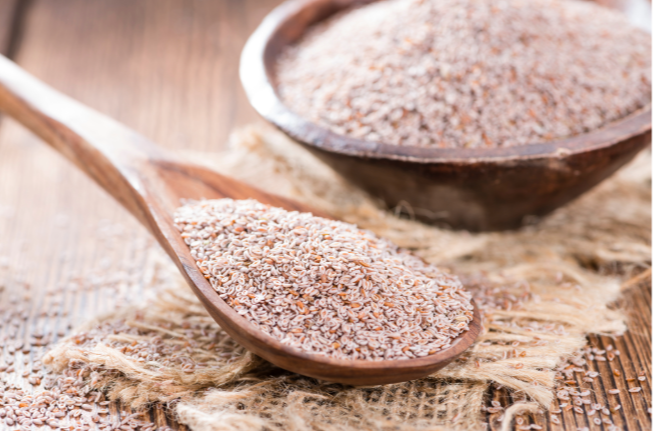What is Psyllium?
Psyllium, a soluble fiber, is derived primarily from the husk of the seeds of the Plantago ovata plant. Known for its high fiber content, psyllium has the unique property of expanding when it absorbs water, forming a viscous, gel-like substance. This characteristic makes psyllium an effective bulking agent that can aid in digestive regularity. It is classified as a prebiotic fiber, which feeds the beneficial bacteria in the gut, helping improve gut health.
Psyllium can be incorporated into one’s diet through food products, such as high-fiber cereals, or as a standalone supplement in powder, capsule, or wafer form. While often used to relieve constipation, psyllium has many health applications. Research shows that psyllium fiber plays a significant role in maintaining heart health, managing blood sugar levels, and supporting weight management. Additionally, as it’s non-fermentable, psyllium is less likely to cause the bloating or gas often associated with other fiber supplements.
Benefits of Psyllium
Psyllium is well-known for its digestive benefits, but its advantages extend to several aspects of health.
- Promotes Digestive Regularity: Psyllium’s primary benefit is as a natural remedy for constipation. Absorbing water in the intestine increases the bulk of stools, making them easier to pass. This effect also helps reduce diarrhea, as psyllium can absorb excess water in the digestive tract, making stool firmer.
- Supports Heart Health: Psyllium has been shown to reduce cholesterol levels, particularly LDL (bad) cholesterol, by binding to cholesterol in the digestive tract and removing it from the body. Regular consumption of psyllium fiber has been linked to lower cholesterol levels, which, in turn, can reduce the risk of heart disease. Psyllium can also help lower blood pressure, further supporting cardiovascular health.
- Blood Sugar Regulation: Psyllium can slow down the digestion and absorption of carbohydrates, which helps stabilize blood sugar levels after meals. This effect is particularly beneficial for individuals with diabetes or those at risk of developing diabetes, as it may reduce blood sugar spikes and improve insulin sensitivity.
- Assists in Weight Management: Psyllium’s ability to form a gel-like substance in the stomach can increase feelings of fullness, reducing appetite and promoting satiety. By reducing the urge to eat between meals, psyllium can help people consume fewer calories, supporting weight management over time.
- Gut Health Benefits: As a prebiotic fiber, psyllium serves as food for beneficial gut bacteria. While it doesn’t ferment in the gut, psyllium can still encourage the growth of healthy bacteria, which plays a role in immune function, mental health, and digestive health. By promoting a balanced gut microbiome, psyllium can reduce inflammation and support overall well-being.
Dosages and What Forms Does Psyllium Come In?
The appropriate dosage of psyllium can vary depending on the intended use, age, and individual response to the fiber.
For adults aiming to improve digestive health or lower cholesterol levels, the standard dosage of psyllium fiber is typically around 5 to 10 grams per day. It is often recommended to start with a lower dose and gradually increase to prevent any discomfort. If the goal is to reduce blood sugar levels or manage weight, a similar dosage may be effective, though individuals should consult with a healthcare provider for personalized recommendations.
Psyllium should be taken with plenty of water, as the fiber needs to absorb water to create the gel that promotes its beneficial effects. Without enough water, psyllium can become overly thick and may pose a choking hazard. Generally, consuming at least eight ounces of water with each dose is advised.
Forms of Psyllium:
- Psyllium Husk Powder: This is the most common and versatile form of psyllium. The husk powder can be mixed into water, juice, or smoothies, making it easy to incorporate into the diet. It’s also sometimes added to recipes for its fiber content.
- Capsules and Tablets: Psyllium in capsule or tablet form is convenient for those who prefer not to drink the fiber powder. Capsules are pre-measured, making it easier to control dosage, though they may require multiple capsules to achieve an effective dose.
- Wafers: Psyllium wafers offer a more enjoyable way to consume psyllium, as they come in different flavors and can be chewed. This form is often preferred by individuals who want a fiber source that doubles as a snack.
- Fortified Foods: Psyllium is also added to various high-fiber foods, such as cereals and meal replacement bars. While convenient, these products may contain added sugars or preservatives, so it’s important to read labels if aiming for a clean source of fiber.
Each form of psyllium has its own benefits, and choosing the best form often depends on personal preferences, convenience, and specific health goals.
Who Should Not Take Psyllium?
Although psyllium is generally safe for most people, there are a few groups who should use caution or avoid psyllium altogether. People with a history of esophageal narrowing or any other digestive tract obstruction should avoid psyllium, as it can expand and potentially cause blockages in such cases.
Individuals with severe asthma should also be cautious, as psyllium husk powder can cause allergic reactions in some people. Those with asthma or known allergies to psyllium should consult a healthcare provider before starting supplementation.
Additionally, psyllium may interfere with the absorption of certain medications, particularly those taken by mouth, such as diabetes medications, antidepressants, and cholesterol-lowering drugs. Taking psyllium and other medications at least a few hours apart can help minimize potential interactions.
For individuals with chronic constipation or irritable bowel syndrome (IBS), it’s best to speak with a healthcare provider before adding psyllium to their diet, as fiber intake needs to be carefully managed in these conditions.
Summary
Psyllium is a natural source of soluble fiber derived from the husks of seeds. Known for its ability to improve digestive health, regulate blood sugar levels, and support heart health, psyllium provides a versatile and effective way to boost fiber intake. It is available in various forms, including powders, capsules, wafers, and fortified foods, making it accessible to individuals with different preferences and needs. However, proper dosage and water intake are required when taking psyllium to avoid any discomfort or complications.
While psyllium is safe for most individuals, those with certain health conditions or sensitivities should exercise caution and consult with a healthcare provider. With its numerous benefits for digestion, heart health, blood sugar control, and weight management, psyllium can be a valuable addition to a balanced diet for individuals looking to enhance their health naturally.


Use Coupon Code: FREE
*Sorry, coupons can't be combined.